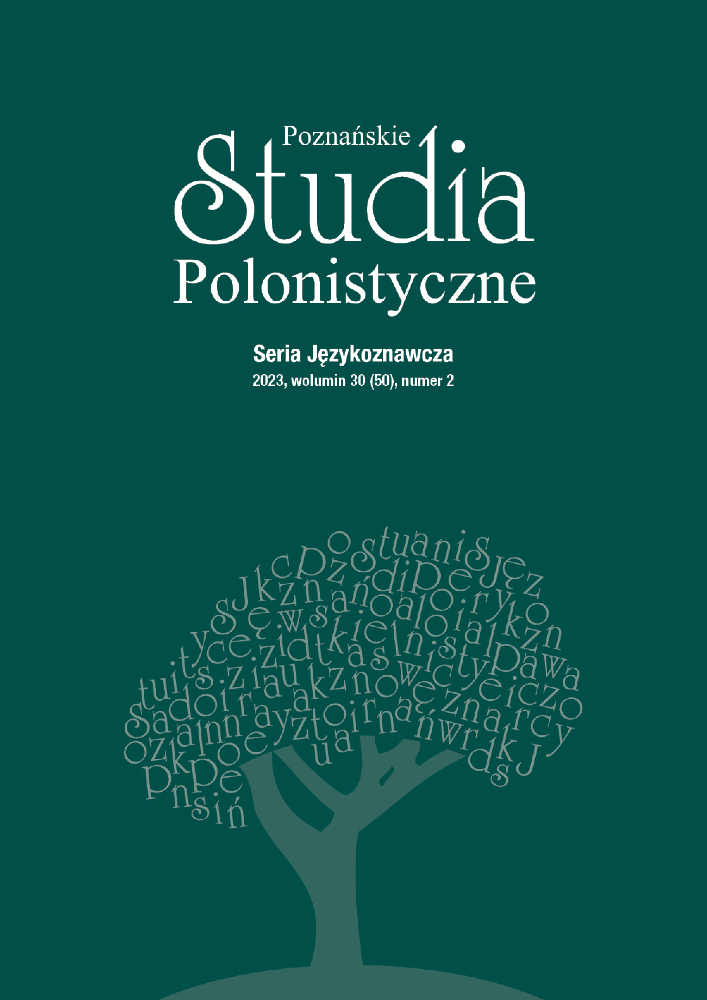Abstract
A method of discursive analysis of archival official texts offers a comprehensive view of historical material, much more in-depth than stylistic analyses. The subject of this description are Polish-language official records created in Upper Silesia between the 16th and 18th centuries, illustrating a certain stage of the formation of institutional legal discourse, present in the Polish communicative space since the Middle Ages. The surviving collections represent various types of discourse, determined by the intentions of the people approaching the office and by the role assumed by the institutional entity both in a specific event and in the formulation of a legal written document. The article outlines the two most common discourses in the collections studied: 1. the chancery discourse, that was aimed to produce documentation that would ensure the approaching parties the right to dispose of property in accordance with the established agreements and financial transaction; 2. the judicial discourse, that involved resolving disputes between community members and ensuring public order. The written forms documenting the actions of the court served a mainly informative and reporting function, and their role was extremely important in the current legal system, as they formed the basis for possible appeal proceedings.
References
TarnG – Kowalska Alina, ed. (1993), Akta miejskie Tarnowskich Gór od końca XVI wieku do roku 1740, Katowice.
Woźn – Szczech Bernard, ed. (2002), Protokolarz miasta Woźniki. 1598–1623, Woźniki.
Opole – Borawski Stanisław, Piirainen Ilpo Tapani, Dormann-Sellinghoff Astrid, ed. (2003), Transliteracja grafemiczna “Księgi protokołów sądu wójtowskiego miasta Opola z lat 1698–1721”, Wrocław.
Dunin-Dudkowska Anna (2010), Akt notarialny jako gatunek wypowiedzi, Lublin.
Grodziński Eugeniusz (1980), Wypowiedzi performatywne. Z aktualnych zagadnień filozofii języka, Wrocław.
Hawrysz Magdalena (2003), Język miejskiej wspólnoty Opola na przełomie XVII i XVIII wieku. Studium pragmalingwistyczne “Księgi wójtowskiej”, Wrocław.
Kość Józef (1993), Socjolingwistyczne aspekty komunikacji językowej w tekstach prawniczych (na przykładzie XVIII-wiecznych protokołów sądowych z ksiąg miejskich Chełma), “Socjolingwistyka”, no. 12–13, p. 155–167.
Kość Józef (1999), Polszczyzna południowokresowa na polsko-ukraińskim pograniczu językowym w perspektywie historycznej, Lublin.
Kość Józef (2012), Skarga w średniowiecznym procesie sądowym, in: Słowa, style, metody, red. Halina Pelcowa, Maria Wojtak, Lublin, p. 103–115.
Kowalska Alina (1986), Dzieje języka polskiego na Górnym Śląsku w okresie habsburskim (1526–1742), Wrocław.
Kuryłowicz Beata (2005), Język polski w szesnastowiecznych księgach miejskich Knyszyna, Białystok.
Lizisowa Maria Teresa (1995), Podstawowe terminy prawne w statutach staropolskich na tle słowiańskim. Studium semantyczne, Kraków.
Malinowska Ewa (1995), Styl urzędowy, in: Przewodnik po stylistyce polskiej, ed. Stanisław Gajda, Opole, p. 431–448.
Malinowska Ewa (2001), Wypowiedzi administracyjne – struktura i pragmatyka, Opole.
Malinowska Ewa (2013), Styl – dyskurs – komunikacja urzędowa, in: Style współczesnej polszczyzny. Przewodnik po stylistyce polskiej, red. Ewa Malinowska, Jolanta Nocoń, Urszula Żydek-Bednarczuk, Kraków, p. 467–486.
Nawrocki Stanisław (1998), Rozwój form kancelaryjnych na ziemiach polskich od średniowiecza do końca XX wieku, Poznań.
Siuciak Mirosława (2017), Język codzienności zapisany w średniopolskich księgach sądowych, in: Socjolekt – idiolekt – idiostyl. Historia i współczesność, ed. Urszula Sokólska, Białystok, p. 301–313.
Siuciak Mirosława (2024), Komunikacja urzędowa na Górnym Śląsku w okresie XVI–XVIII wieku. Ujęcie dyskursologiczne, Katowice. DOI: https://doi.org/10.31261/PN.4217
Skubalanka Teresa (1984), Historyczna stylistyka języka polskiego. Przekroje, Wrocław.
Szczepankowska Irena (2004), Język prawny I Rzeczypospolitej w “Zbiorze praw sądowych” Andrzeja Zamoyskiego, part 1: Pojęcia prawne, Białystok.
Szczepankowska Irena (2016), Dyskurs prawny. Języki, teksty, konteksty, Białystok.
Wiśniewska Halina (1977), Stylistyczne i socjalne odmiany polszczyzny lublinian XVII wieku, Lublin.
Wiśniewska Halina (1983), Lubelskie zeznania sądowe z XVII wieku jako przykład dwufazowego procesu komunikacji, “Studia z Filologii Polskiej i Słowiańskiej”, vol. 21, s. 129–141.
Wojtak Maria (1993), Styl urzędowy, in: Encyklopedia kultury polskiej XX wieku, vol. 2: Współczesny język polski, ed. Jerzy Bartmiński, Wrocław, p. 147–162.
Wyderka Bogusław (1991), Język polski w śląskich dokumentach kancelaryjnych z XVIII wieku. Elementy struktury i pragmatyki tekstu, “Studia z Filologii Polskiej i Słowiańskiej”, vol. 27, p. 89–100.
Zajda Aleksander (2001), Studia z historii polskiego słownictwa prawniczego i frazeologii, Kraków.
License
Copyright (c) 2024 Mirosława Siuciak

This work is licensed under a Creative Commons Attribution-NoDerivatives 4.0 International License.
Authors
The Author declares that they are entitled to personal and property (material) copyrights to their work published in “Poznańskie Studia Polonistyczne. Seria Językoznawcza”, and that these rights are not limited by the terms of Author’s agreement. The Author warrants the originality, authorship, and sole ownership of all rights to the Work, and affirms that they have the right to grant all kinds of licenses hereinabove without infringing on the intellectual property rights of any third party, including personal rights.
The Author(s) retains copyright to their article and the right to freely dispose of the work, granting Adam Mickiewicz University in Poznań a non-exclusive, royalty-free licence under the Attribution-NoDerivatives 4.0 International (CC BY-ND 4.0) Creative Commons licence to use the Work without territorial restrictions for an indefinite period in the fields of use designated in the Author’s agreement.
Users
Interested Internet users are entitled to use works published in „Poznańskie Studia Polonistyczne. Seria Językoznawcza” since 2016 under the following conditions:
- attribution - obligation to provide, together with the distributed work, information about the authorship, title, source (link to the original work, DOI) and the license itself.
- no derivatives - the work must be preserved in its original form, without the author's consent it is not possible to distribute the modified work, such as translations, publications, etc.
Copyrights are reserved for all texts published before 2016.
Other
Adam Mickiewicz University in Poznań retains the right to the journal as a whole (including its layout, graphic design, title, cover design, logo and more).

